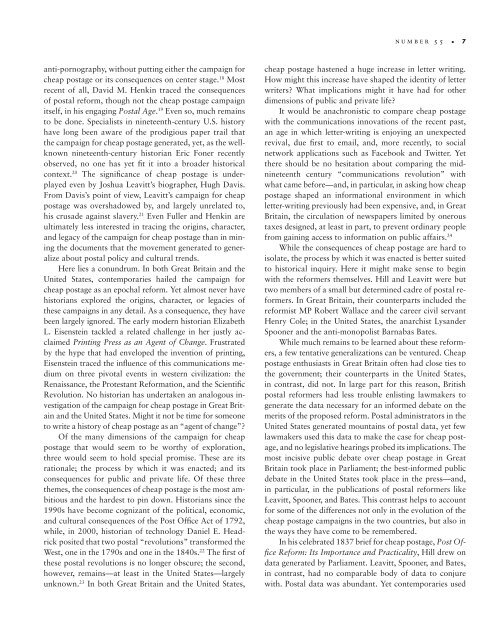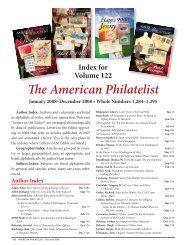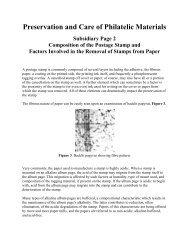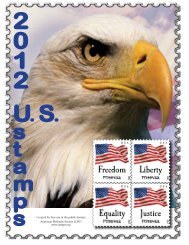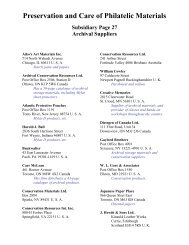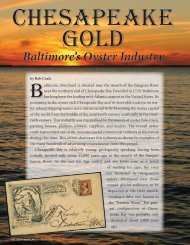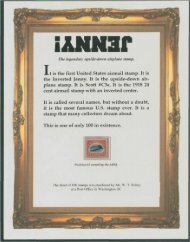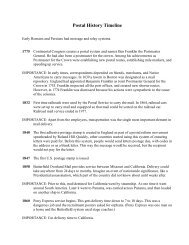The Winton M. Blount Postal History Symposia - Smithsonian ...
The Winton M. Blount Postal History Symposia - Smithsonian ...
The Winton M. Blount Postal History Symposia - Smithsonian ...
- No tags were found...
Create successful ePaper yourself
Turn your PDF publications into a flip-book with our unique Google optimized e-Paper software.
n u m b e r 5 5 • 7anti- pornography, without putting either the campaign forcheap postage or its consequences on center stage. 18 Mostrecent of all, David M. Henkin traced the consequencesof postal reform, though not the cheap postage campaignitself, in his engaging <strong>Postal</strong> Age. 19 Even so, much remainsto be done. Specialists in nineteenth- century U.S. historyhave long been aware of the prodigious paper trail thatthe campaign for cheap postage generated, yet, as the wellknownnineteenth- century historian Eric Foner recentlyobserved, no one has yet fit it into a broader historicalcontext. 20 <strong>The</strong> significance of cheap postage is underplayedeven by Joshua Leavitt’s biographer, Hugh Davis.From Davis’s point of view, Leavitt’s campaign for cheappostage was overshadowed by, and largely unrelated to,his crusade against slavery. 21 Even Fuller and Henkin areultimately less interested in tracing the origins, character,and legacy of the campaign for cheap postage than in miningthe documents that the movement generated to generalizeabout postal policy and cultural trends.Here lies a conundrum. In both Great Britain and theUnited States, contemporaries hailed the campaign forcheap postage as an epochal reform. Yet almost never havehistorians explored the origins, character, or legacies ofthese campaigns in any detail. As a consequence, they havebeen largely ignored. <strong>The</strong> early modern historian ElizabethL. Eisenstein tackled a related challenge in her justly acclaimedPrinting Press as an Agent of Change. Frustratedby the hype that had enveloped the invention of printing,Eisenstein traced the influence of this communications mediumon three pivotal events in western civilization: theRenaissance, the Protestant Reformation, and the ScientificRevolution. No historian has undertaken an analogous investigationof the campaign for cheap postage in Great Britainand the United States. Might it not be time for someoneto write a history of cheap postage as an “agent of change”?Of the many dimensions of the campaign for cheappostage that would seem to be worthy of exploration,three would seem to hold special promise. <strong>The</strong>se are itsrationale; the process by which it was enacted; and itsconsequences for public and private life. Of these threethemes, the consequences of cheap postage is the most ambitiousand the hardest to pin down. Historians since the1990s have become cognizant of the political, economic,and cultural consequences of the Post Office Act of 1792,while, in 2000, historian of technology Daniel E. Headrickposited that two postal “revolutions” transformed theWest, one in the 1790s and one in the 1840s. 22 <strong>The</strong> first ofthese postal revolutions is no longer obscure; the second,however, remains—at least in the United States—largelyunknown. 23 In both Great Britain and the United States,cheap postage hastened a huge increase in letter writing.How might this increase have shaped the identity of letterwriters? What implications might it have had for otherdimensions of public and private life?It would be anachronistic to compare cheap postagewith the communications innovations of the recent past,an age in which letter- writing is enjoying an unexpectedrevival, due first to email, and, more recently, to socialnetwork applications such as Facebook and Twitter. Yetthere should be no hesitation about comparing the midnineteenthcentury “communications revolution” withwhat came before—and, in particular, in asking how cheappostage shaped an informational environment in whichletter- writing previously had been expensive, and, in GreatBritain, the circulation of newspapers limited by oneroustaxes designed, at least in part, to prevent ordinary peoplefrom gaining access to information on public affairs. 24While the consequences of cheap postage are hard toisolate, the process by which it was enacted is better suitedto historical inquiry. Here it might make sense to beginwith the reformers themselves. Hill and Leavitt were buttwo members of a small but determined cadre of postal reformers.In Great Britain, their counterparts included thereformist MP Robert Wallace and the career civil servantHenry Cole; in the United States, the anarchist LysanderSpooner and the anti- monopolist Barnabas Bates.While much remains to be learned about these reformers,a few tentative generalizations can be ventured. Cheappostage enthusiasts in Great Britain often had close ties tothe government; their counterparts in the United States,in contrast, did not. In large part for this reason, Britishpostal reformers had less trouble enlisting lawmakers togenerate the data necessary for an informed debate on themerits of the proposed reform. <strong>Postal</strong> administrators in theUnited States generated mountains of postal data, yet fewlawmakers used this data to make the case for cheap postage,and no legislative hearings probed its implications. <strong>The</strong>most incisive public debate over cheap postage in GreatBritain took place in Parliament; the best- informed publicdebate in the United States took place in the press—and,in particular, in the publications of postal reformers likeLeavitt, Spooner, and Bates. This contrast helps to accountfor some of the differences not only in the evolution of thecheap postage campaigns in the two countries, but also inthe ways they have come to be remembered.In his celebrated 1837 brief for cheap postage, Post OfficeReform: Its Importance and Practicality, Hill drew ondata generated by Parliament. Leavitt, Spooner, and Bates,in contrast, had no comparable body of data to conjurewith. <strong>Postal</strong> data was abundant. Yet contemporaries used


